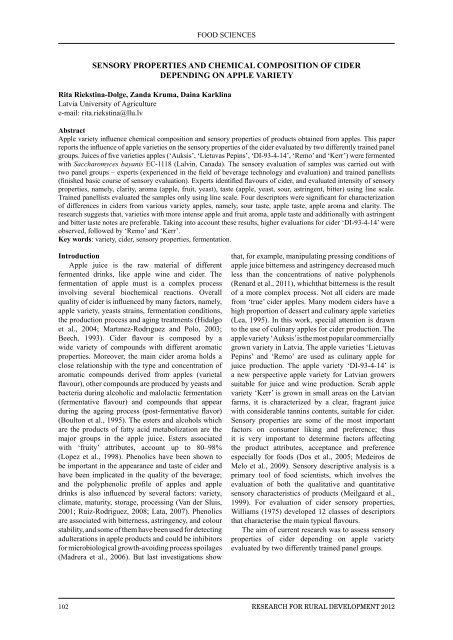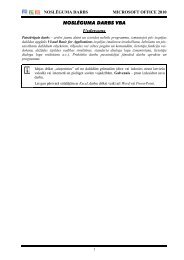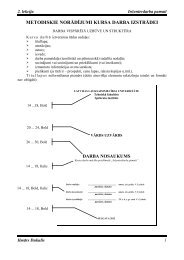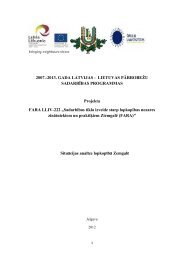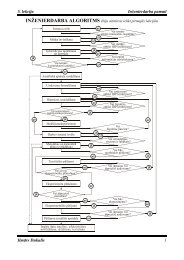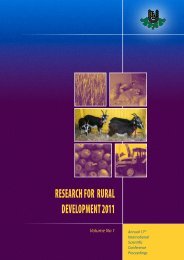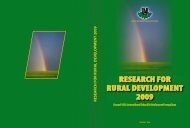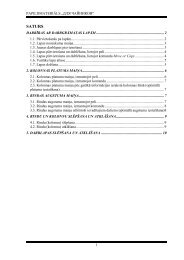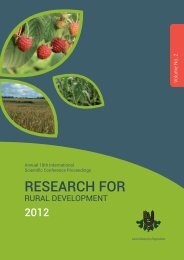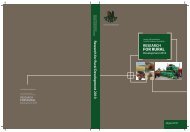LATVIA UNIVERSITY OF AGRICULTURE - Latvijas ...
LATVIA UNIVERSITY OF AGRICULTURE - Latvijas ...
LATVIA UNIVERSITY OF AGRICULTURE - Latvijas ...
- No tags were found...
You also want an ePaper? Increase the reach of your titles
YUMPU automatically turns print PDFs into web optimized ePapers that Google loves.
FOOD SCIENCESSensory PROPERTIES and chemical composition of CIDERdepending on apple varietyRita Riekstina-Dolge, Zanda Kruma, Daina KarklinaLatvia University of Agriculturee-mail: rita.riekstina@llu.lvAbstractApple variety influence chemical composition and sensory properties of products obtained from apples. This paperreports the influence of apple varieties on the sensory properties of the cider evaluated by two differently trained panelgroups. Juices of five varieties apples (‘Auksis’, ‘Lietuvas Pepins’, ‘DI-93-4-14’, ‘Remo’ and ‘Kerr’) were fermentedwith Saccharomyces bayanis EC-1118 (Lalvin, Canada). The sensory evaluation of samples was carried out withtwo panel groups – experts (experienced in the field of beverage technology and evaluation) and trained panellists(finished basic course of sensory evaluation). Experts identified flavours of cider, and evaluated intensity of sensoryproperties, namely, clarity, aroma (apple, fruit, yeast), taste (apple, yeast, sour, astringent, bitter) using line scale.Trained panellists evaluated the samples only using line scale. Four descriptors were significant for characterizationof differences in ciders from various variety apples, namely, sour taste, apple taste, apple aroma and clarity. Theresearch suggests that, varieties with more intense apple and fruit aroma, apple taste and additionally with astringentand bitter taste notes are preferable. Taking into account these results, higher evaluations for cider ‘DI-93-4-14’ wereobserved, followed by ‘Remo’ and ‘Kerr’.Key words: variety, cider, sensory properties, fermentation.IntroductionApple juice is the raw material of differentfermented drinks, like apple wine and cider. Thefermentation of apple must is a complex processinvolving several biochemical reactions. Overallquality of cider is influenced by many factors, namely,apple variety, yeasts strains, fermentation conditions,the production process and aging treatments (Hidalgoet al., 2004; Martınez-Rodrıguez and Polo, 2003;Beech, 1993). Cider flavour is composed by awide variety of compounds with different aromaticproperties. Moreover, the main cider aroma holds aclose relationship with the type and concentration ofaromatic compounds derived from apples (varietalflavour), other compounds are produced by yeasts andbacteria during alcoholic and malolactic fermentation(fermentative flavour) and compounds that appearduring the ageing process (post-fermentative flavor)(Boulton et al., 1995). The esters and alcohols whichare the products of fatty acid metabolization are themajor groups in the apple juice. Esters associatedwith ‘fruity’ attributes, account up to 80–98%(Lopez et al., 1998). Phenolics have been shown tobe important in the appearance and taste of cider andhave been implicated in the quality of the beverage;and the polyphenolic profile of apples and appledrinks is also influenced by several factors: variety,climate, maturity, storage, processing (Van der Sluis,2001; Ruiz-Rodriguez, 2008; Lata, 2007). Phenolicsare associated with bitterness, astringency, and colourstability, and some of them have been used for detectingadulterations in apple products and could be inhibitorsfor microbiological growth-avoiding process spoilages(Madrera et al., 2006). But last investigations showthat, for example, manipulating pressing conditions ofapple juice bitterness and astringency decreased muchless than the concentrations of native polyphenols(Renard et al., 2011), whichthat bitterness is the resultof a more complex process. Not all ciders are madefrom ‘true’ cider apples. Many modern ciders have ahigh proportion of dessert and culinary apple varieties(Lea, 1995). In this work, special attention is drawnto the use of culinary apples for cider production. Theapple variety ‘Auksis’ is the most popular commerciallygrown variety in Latvia. The apple varieties ‘LietuvasPepins’ and ‘Remo’ are used as culinary apple forjuice production. The apple variety ‘DI-93-4-14’ isa new perspective apple variety for Latvian growerssuitable for juice and wine production. Scrab applevariety ‘Kerr’ is grown in small areas on the Latvianfarms, it is characterized by a clear, fragrant juicewith considerable tannins contents, suitable for cider.Sensory properties are some of the most importantfactors on consumer liking and preference; thusit is very important to determine factors affectingthe product attributes, acceptance and preferenceespecially for foods (Dos et al., 2005; Medeiros deMelo et al., 2009). Sensory descriptive analysis is aprimary tool of food scientists, which involves theevaluation of both the qualitative and quantitativesensory characteristics of products (Meilgaard et al.,1999). For evaluation of cider sensory properties,Williams (1975) developed 12 classes of descriptorsthat characterise the main typical flavours.The aim of current research was to assess sensoryproperties of cider depending on apple varietyevaluated by two differently trained panel groups.102 Research for Rural Development 2012


